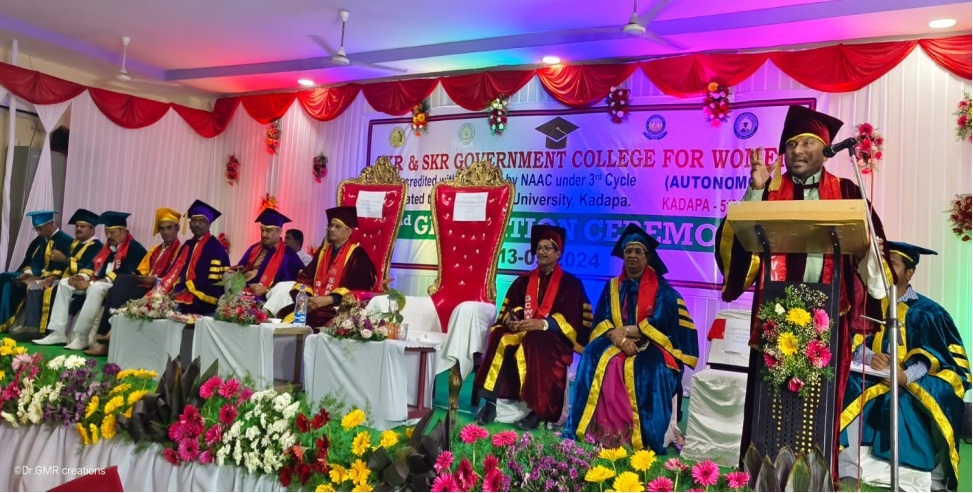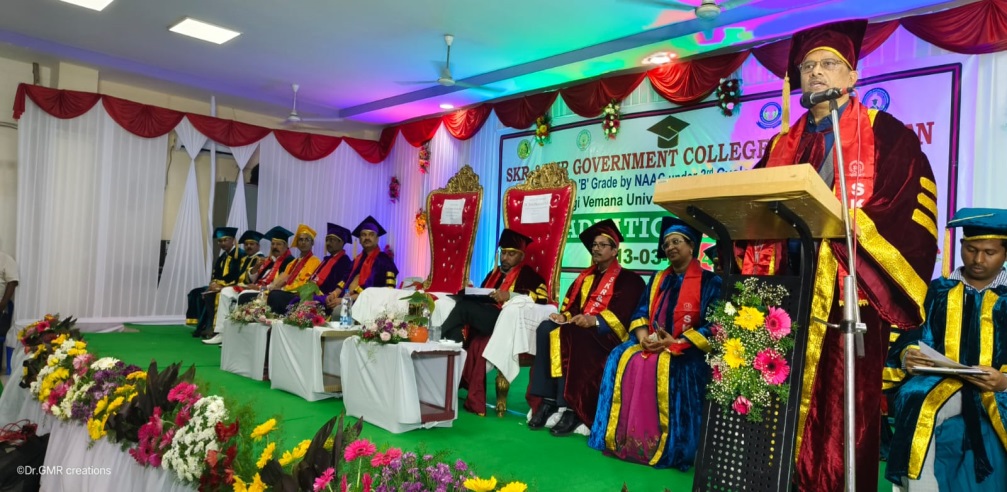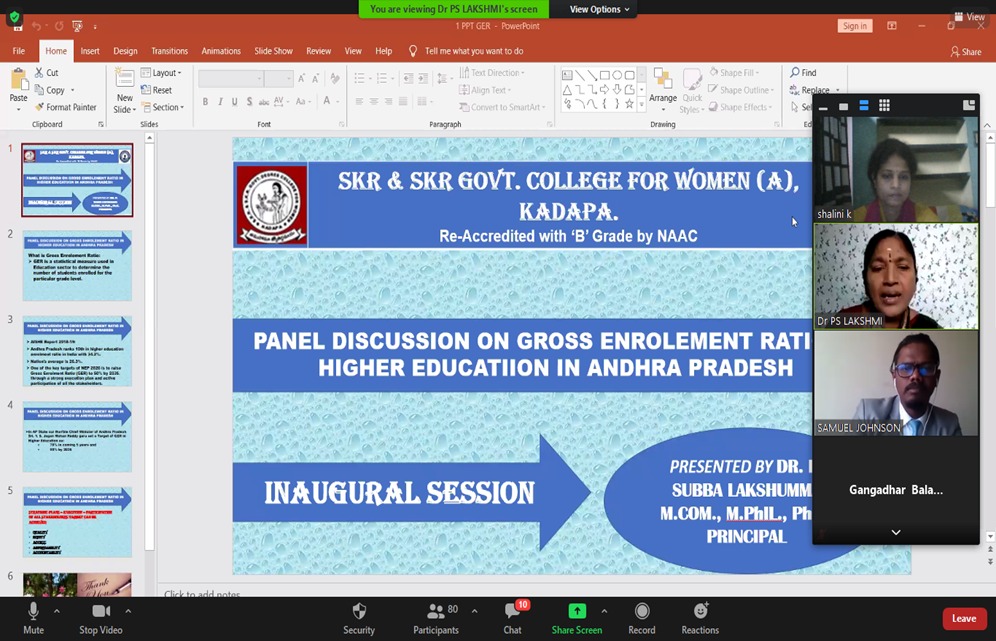MATHEMATICS - PANEL DISCUSSION ON GROSS ENROLMENT RATIO IN HIGHER EDUCATION
SKR & SKR GOVT. COLLEGE FOR WOMEN(A), KADAPA
(Reaccredited with ‘B’ by NAAC Grade)
PANEL DISCUSSION ON
“STRATEGIES FOR ENHANCEME NT OF GROSS ENROLMENT RATIO
IN HIGHER EDUCATION IN ANDHRA PRADESH”
Principal Dr. P. Subba Lakshumma, M.Com., M.Phil, Ph.D. and IQAC Team organised a Virtual Panel Discussion on “Strategies for enhancement of Gross Enrollment Ratio in Higher Education in Andhra Pradesh” on 12-12-2020 and the following strategies are discussed to enhance the Gross Enrolment Ratio in Higher Education. For this Panel Discussion two experienced and experts resource persons are invited namely Prof. S. Raghunatha Reddy, Ex-Director of Admissions and Head. Department of Commerce, Yogi Vemana University, Kadapa and Prof. K. Samuel Johnson, Asst. Director, Academic Staff College and Faculty, VIT, AP School of Business (VSB), Amaravathi.
236 members registered for this discussion and 103 members participated from Andhra Pradesh and Karnataka from various reputed Institutions.
Dr. P. Subba Lakshumma, Principal, SKR & SKR Govt. College for Women (A), Kadapa has inaugurated the Panel Discussion and focussed on the report of AISHE 2018-19 that the India’s GER in higher education is 26.3% and Andhra Pradesh ranks 10th in higher education in Enrolment Ratio in India with 34.2%. It is higher than the nation’s average. One of the key targets of NEP 2020 is to raise Gross Enrolment Ratio (GER) to 50% by 2035. through a strong execution of plan and active participation of all the stakeholders.
In AP State, our Hon’ble Chief Minister of Andhra Pradesh Sri. Y. S. Jagan Mohan Reddy garu set a Target of GER in Higher Education to achieve 70% enrolment in coming 5 years and it should be enhanced to 90% by 2035. This goal can be accomplished with constructive Strategic plans, and their execution by involving of all stakeholders. And the HEIs should adhered to the principles of:
- Quality Education
- Equity principle
- Access to all the eligible students
- Affordability to all the students
- Accountability is ensured
Prof. S. Raghunatha Reddy, Ex-Director of Admissions and Head. Department of Commerce, Yogi Vemana University, has thrown light on the factors and suggestions to enhance the enrolment by improving girl child education by utilising the resources available. The Gross Enrolment Ratio (GER) in higher education has increased from 25.8 per cent in 2017-18 to 26.3 per cent in 2018-19, while in absolute terms the enrolment increased from 3.66 crore to 3.74 crore students, according to All India Survey on Higher Education (AISHE). Sir suggested that instead of GER, India should look at Eligibility Enrollment Ratio (EER), which is the ratio of eligible population those who have at least passed class 12 in the 18-23 age group to the number of people attending to colleges. Sir suggested that in order to increase access to Higher Education, new institutions of National Importance viz. Indian Institutes of Technology, Indian Institute of Information Technology, Indian Institutes of Science Education and Research, National Institutes of Technology, universities and Colleges should be established, intake capacity of existing institutions has to be enhanced, quality in distance education is ensured and quality of private educational institutions should be improved and provide opportunities for students belonging to disadvantaged sections of the society.
Prof K. Samuel Johnson, Asst. Director, Academic Staff College and Faculty, VIT, AP School of Business (VSB), Amaravathi interacted and motivated by involving all the participants in panel discussion about the schemes and Technology based education.
Recommendations:
- Technology based education provides new approaches and increases opportunities for students. Online learning platforms and LMS (Learning Management Systems) can be accessed anywhere and anytime and active learning or hands on learning can be imparted to students to learn from experience as well as each other by trying out different learning methods and International communication is possible.
- Flipped learning is a type of blended learning that reverses the traditional teaching approach. It is about applying learning and increases the student teacher interaction in the classroom. Subsidy Schemes on education should be given to Economically Weaker Sections in Technical and Professional education.
- HEIs must be encouraged to experiment and must be created to share outcomes and best practices. Need for new faculty with technical competencies are suggested and also doubling the number of Ph.D. fellowships in our best institutions, particularly for the humanities and social sciences; well-designed faculty development programmes to enhance the skill-sets of existing faculty; and a structured programme to attract Indian scholars teaching overseas. A good ICT is needed for effective administration and governance of the large multi-disciplinary universities and colleges envisaged by the NEP.
- Every Institution should introduce the ‘earn while you learn’ option in colleges and universities, stating that outsourced work by the government can be undertaken by the students on a part time basis. More Skill based and Market Oriented courses should be implemented in all the Institutions. The Government took step by opening new engineering, arts and science colleges in rural areas and strengthen the infrastructure.


















